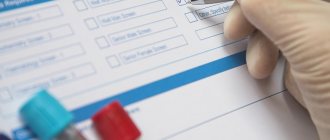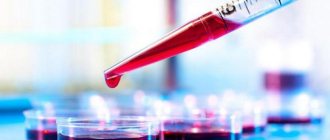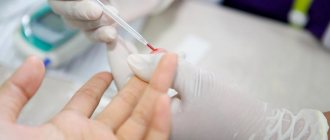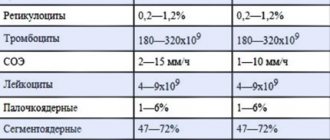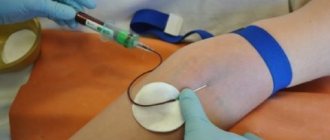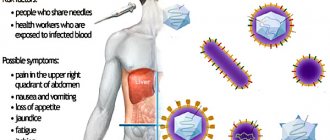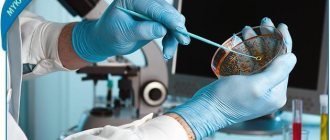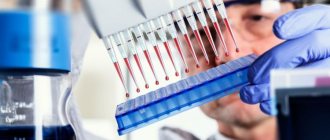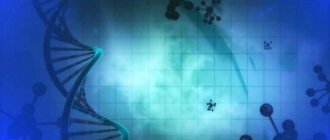5
Author of the article: Marina Dmitrievna
2017.09.29
32 741
Blood analysis
To get a complete picture of the disease, determine the cause of the patient’s illness, and find out how well the internal organs are functioning, doctors prescribe a blood test.
Some tests are completed in two to three hours, while others take several weeks. Patients are often interested in the question of how many days a biochemical blood test is done, since it is one of the main studies in a hospital, and the prescription of a further course of treatment depends on the results of this study. This method of laboratory diagnostics has a high degree of informative reliability and can be used in all areas of medicine.
Laboratory diagnostics: research methods
Laboratory medical tests provide significant assistance to specialists in determining the diagnosis. Laboratory diagnostics is an integral part of the therapeutic course, since the accuracy and reliability of the studies provide the optimal and correct choice of further treatment of the disease.
But the specialist decides for himself what method the diagnosis of pathology will be based on. Currently, there are many types of laboratory tests, each of which has its own name, as well as methods for processing information and obtaining results. Each has its own reference values, that is, the average value of a specific laboratory indicator, which is obtained as a result of large-scale diagnostics of healthy people.
Popular clinical diagnostic methods include urine and blood tests, ultrasound, numerous types of biopsies, etc. One of the most common and important methods is a blood test. It is easy to use, almost painless and quite informative. However, it is impossible to say unambiguously how long a blood test will take. This parameter is determined directly by the method used.
So, let’s figure out how long a blood test takes.
How long does it take to prepare a general blood test - indications for performance, interpretation
To get a complete picture of the disease, determine the cause of the patient’s illness, and find out how well the internal organs are functioning, doctors prescribe a blood test.
Some tests are completed in two to three hours, while others take several weeks.
Patients are often interested in the question of how many days a biochemical blood test is done, since it is one of the main studies in a hospital, and the prescription of a further course of treatment depends on the results of this study. This method of laboratory diagnostics has a high degree of informative reliability and can be used in all areas of medicine.
How to get a copy of the tests
There is no unified analysis base in our country. Now the results obtained are pasted into an outpatient card, and it is stored in the clinic’s reception desk. This is inconvenient because sometimes tests have to be repeated.
In order not to take the same fluorography several times, you can request copies of the tests from the reception desk.
To do this, you need to write an application for copies of medical documents, make a copy, give the original to the registry, and ask for an acceptance stamp on the copy.
If the registry refuses to put a stamp, send the application by registered mail with acknowledgment of receipt.
Application-request for copies of analyzes
If the exact title of the document is unknown, request an extract containing the information you are interested in. For example, like this: “Please provide an extract from medical documents containing information about the state of my digestive system, including the results of tests and examinations performed.”
What indicators are determined during OAC?
As mentioned above, not a single diagnosis can be done without this examination, because a general blood test shows the presence of inflammatory and infectious diseases, anemia and cancer. Its results often become the starting point for a further set of diagnostic procedures.
Thus, when routine medical examinations are carried out, which involve taking a UAC and a general urinalysis (general urinalysis), and some people are indignant about why these studies are needed and try to refuse, they do not understand what risk they are exposing themselves to. Whereas regular implementation of all necessary procedures makes it possible to timely identify dangerous pathologies and prescribe adequate therapy.
The minimum number of indicators that are included in a general blood test are the 5 main ones mentioned earlier, and then their detailed characteristics and normal coefficients for patients of different genders and ages will be considered. Their deviations from the reference values will immediately indicate to the doctor possible health problems of the subject.
Hemoglobin(Hb)
This protein is one of the main components of red blood cells - erythrocytes. If its level drops, this often indicates a lack of iron, which, in turn, causes a decrease in the synthesis of vitamin B12 and hemoglobin itself.
Blood test timing
It is difficult to say how long the study will take. This is due to the fact that in modern medicine there are various types of diagnostics of this biomaterial. In this regard, it is necessary to consider each method separately, paying attention to the fact that laboratories determine their own deadlines for performing the analysis and issuing results to the patient. The studies, which are deciphered in a few hours, are as follows: general analysis; establishing a person's blood group; rapid tests for determining human immunodeficiency virus, syphilis and hepatitis.
Analysis of urine
Urine testing is a complex laboratory exercise through which a number of chemical and physical characteristics of a given substance are revealed, on the basis of which a specific diagnosis can be made. Due to its ease of implementation and high information content, this analysis is considered an integral part of any diagnosis. Decoding a urine test involves a description based on the following indicators:
- color;
- transparency;
- acidity index and specific gravity.
After this, the presence of specific elements in the urine is assessed, such as:
- glucose;
- protein;
- ketone bodies;
- bile pigments;
- inorganic substances;
- hemoglobin;
- blood cells (red blood cells, white blood cells, etc.), as well as cells that are found in the genitourinary tract.
A study is prescribed in the following cases:
- with an auxiliary study of the functioning of the urinary system;
- when monitoring the development of the disease and checking the quality of their therapy;
- for any diagnosis of pathologies in the body.
Using this analysis, it is possible to diagnose renal disorders, diseases of the prostate gland, bladder, various tumors, as well as a number of pathological phenomena in the early stages, when there are no clinical symptoms.
General research
People often ask how long a blood test is done.
The general analysis includes establishing the concentration of platelets, hemoglobin, leukocytes, red blood cells and calculating the erythrocyte sedimentation rate and leukocyte formula. This research method is used to determine inflammatory, infectious and hematological diseases, as well as to assess a person’s condition.
Among other things, a general blood test makes it possible to determine the effectiveness of current therapy. A sample of biomaterial for research is usually taken from a finger. No special preparation is required to carry out the diagnosis. However, it should be said that blood sampling must be carried out before meals. The result can be collected in approximately 1.5 or 2 hours.
How long does it take to do a blood test to determine its type?
Biochemical research: preparation
Any pathology leaves its mark in the form of changes in blood composition. By determining the concentration of various elements in “biochemistry”, one can conclude about the presence of a disease and monitor the progress of treatment.
It is mandatory to carry out this test during pregnancy. The collection of material for research is carried out in the first and last trimester if the woman is in normal health, and in case of unwellness, and if the pregnancy proceeds with complications, then 5-6 times throughout the entire period.
It is recommended to prepare for a biochemical blood test by observing the following conditions:
- biomaterial is taken in the morning, on an empty stomach, only drinking water is allowed;
- Be sure to take a break from taking medications; if this is not possible, you should inform your doctor;
- stop drinking alcoholic beverages 24 hours before the test, and smoking an hour before;
- after physical and emotional overload, stress, physiotherapeutic procedures, the analysis should be postponed to a later date.
All the results obtained have clear standards corresponding to the indications of blood tests of healthy people. Each hospital interprets the clinical analysis according to its own criteria.
Material collection
The results of biochemical analysis have differences in parameters in men and women, in people of different ages. Therefore, the doctor must make a final conclusion not only based on the results of the study, but also on the collected medical history.
Express tests
How long does it take to test a blood for hepatitis, syphilis, HIV?
A rapid test for diagnosing hepatitis is a high-quality and quick test at home to determine antibodies to this virus. Blood is taken from a finger, and the test result will be ready in just fifteen minutes.
A rapid test for diagnosing syphilis can also be performed at home, but this test detects Treponema pallidum bacteria. They indicate that a person has syphilis. Blood is also taken capillary, from a finger, the result will be ready in ten to fifteen minutes.
An HIV test is a blood test for the presence of the human immunodeficiency virus. At home, the results will be ready in just a few minutes. Blood is taken from a finger. It must be said that rapid testing can be used not only at home. They are also used by medical laboratories, and in terms of time (the period of blood testing using these systems), the tests do not differ from those carried out at home.
Among other things, there are many types of rapid testing, that is, blood tests at home, for example, to diagnose embryonal cancer antigen, rubella and cancer markers. The patient can only find out how many tests are performed using express systems in the instructions.
How long a blood test for biochemistry is done is of interest to many.
What does biochemistry show?
The results obtained are entered into a special table. The following indicators are studied:
- total protein, albumin, glycated hemoglobin, C-reactive and other types of proteins;
- all types of enzymes including lactate and lipase;
- cholesterol and other lipids;
- fructosamine and glucose;
- total and direct bilirubin;
- nitrogenous and inorganic substances, vitamins.
Most people, having received a referral from a doctor, raise the question of how long it takes to prepare a biochemical blood test. This is especially important to know if a person has bleeding, cancer, or is suspected of HIV, hepatitis and other diseases in which delaying the study can lead to irreversible changes in the body.
| How long does it take to do research in pregnant women? | Screening is carried out several times, the result is known the next day. |
| Blood biochemistry to detect pregnancy, how many days it is done | Checking the hCG test may take 1.5 weeks. |
| How long does it take to prepare a blood test for biochemistry for hair loss? | To answer this question, the functioning of the liver, kidneys, hormonal levels and calcium levels are checked. The study takes about 2 weeks. |
| Blood test for biochemistry in a child, how long it takes to do | How long you will have to wait for the data depends on the disease for which the material is being submitted. |
| How many days does it take to prepare a biochemical analysis of urine and blood? | Duration is 4-5 working days |
| How long does it take to test for HIV and blood biochemistry for hepatitis? | Depends on the type of study. A test test takes about 2 days, and a full blood test takes 2 weeks. |
The time for obtaining the results of the study depends on the purpose of the diagnosis.
The appointment of a LHC occurs after basic general tests have been carried out. Usually the pathology has already been identified, or the doctor has a well-founded suspicion of it, and he only needs confirmation to begin treatment. Therefore, the sooner the patient submits the material for research, the sooner the results will be ready.
Interesting facts about the composition of blood and methods of analyzing it can be learned from the video:
Tests that require several days
There are also types of blood tests that are carried out over several days. These include: blood sugar testing; analysis of biomaterial for human immunodeficiency virus, hepatitis and syphilis in laboratory conditions; biochemical blood diagnostics; hormonal diagnostics; study of the hemostasis system. However, how many of the blood tests listed above are done becomes clear only after describing their properties.
A blood sugar test is a determination of the glucose level in the blood. A biomaterial sample is taken from a finger on an empty stomach. This research method is used to establish diabetes mellitus. However, for patients after forty years of age, it is performed regularly, regardless of the presence of the disease. The results of a blood test for sugar will be ready within 24 hours.
In laboratory conditions, an analysis for the human immunodeficiency virus allows one to determine antibodies to this type of infection. It is performed on a venous blood sample, the result will be ready within 2-10 days.
If the blood is tested for syphilis (in the laboratory), the result will be ready in 4-7 days, when testing the biomaterial for hepatitis, enzyme immunoassay and serological blood tests - from a week to two.
A study of the hemostasis system allows you to get results in a couple of days. The patient should be informed by the attending specialist about the timing of the analysis of biomaterial for hormonal studies. Since the content of hormones changes in different phases of the life cycle, blood is taken for analysis only according to an individual established schedule. However, on average, such a study is ready in a period of two to thirty days.
Rules for conducting analysis
If we talk about the rules for passing this analysis, then there are no strict and complex regulations regarding this, but there are certain restrictions:
- The analysis is carried out in the morning. Before this, it is prohibited to consume food or drinks several hours before taking a sample of biomaterial.
- The main medical instruments used in this laboratory test are cotton wool, a scarifier and alcohol.
- For the examination, capillary blood is used, which is taken from a finger. In some cases, according to the instructions of a specialist, venous blood may be taken.
- Then the analysis is deciphered. There are also special hematological analyzers, with which it is possible to determine up to 24 blood parameters automatically. Such devices produce a printout with a transcript of the study almost immediately after taking blood.
How long does it take to perform a biochemical blood test?
Among the diagnostics carried out, a special place belongs to biochemical analysis. It is difficult to determine how long such research is carried out over time. Blood is taken from a vein; the biochemical values found make it possible to diagnose almost all ongoing processes in the human body.
You can check with your doctor for how many days a biochemical blood test is done.
There are no special rules for preparing for this type of study. And how many days such an analysis is done is determined only by the list of diagnosed biochemical elements. Results, as a rule, can be ready within an hour or within a month. Blood biochemistry is used in almost every medical field, because in the process of this research the hormonal, biochemical and immunological conditions of the human body are diagnosed. This is a reliable way to identify many types of diseases in the early stages.
Analyzes that require preparation and a long time to decipher
Unfortunately, not all studies can be deciphered in a short time. Markers that take several days to verify include:
- Sugar (glucose).
- AIDS and HIV infection.
- Hormones produced by the thyroid gland.
- HCG.
- Tumor markers.
This also includes blood biochemistry, serological and enzyme immunoassay diagnostics.
How long does it take to decipher these analyses? All this is interconnected with the technology of material analysis and the chemical base that the laboratory technician uses in his work. Blood sugar levels are determined within a few days; immunodeficiency is diagnosed within 3-11 days. Hormonal levels are studied for the longest time - the period varies from 3 to 30 days.
Due to the scale of development of cancer, patients are interested in how long it takes to decipher blood for tumor markers. The result is issued within ten days after the analysis. The time costs are greatly influenced by the location and size of the tumor. Thanks to this study, the doctor can determine the diagnosis and develop a suitable therapy for the patient.
We have already found out how long a general blood test takes, but how quickly is the biochemical one deciphered? On average, a laboratory technician spends 2 to 21 days on this study. Timing is closely related to the purpose of the analysis.
Important! A biochemical test requires some preparation from the patient. This includes a ban on alcohol and nicotine two days before the procedure, emotional and physical stress 72 hours before the test, and refusal to eat 12 hours before blood sampling.
Biochemical blood test
Even infants should donate blood on an empty stomach. They can be fed 3 hours before the procedure.
You can find out more detailed information about the blood test and preparation for it from this video:
In the clinic
If we are talking about how many blood tests are done in a clinic, everything will be determined by what equipment it has. If it is modern, it will take the laboratory assistant no more than an hour to decipher the information.
When using outdated devices to process information in a clinic, it will take at least three hours to get a result. However, despite the fact that the result of the analysis can be obtained very quickly if desired, in most medical institutions this study is officially done within 24 hours.
As a rule, private laboratories provide results faster.
We looked at how many days a blood test is done.
What is a blood group test and how to take it correctly
A blood test to determine the group is usually carried out in the following cases:
- for upcoming surgery,
- when registering pregnant women,
- at birth,
- before an upcoming blood transfusion.
How is blood belonging to a certain group determined?
Human red blood cells contain adhesive substances called agglutinogens. In humans, there are 2 types of them, they are designated by the letters A and B.
The presence or absence of these substances in the blood determines whether the blood belongs to one group or another.
Group I - no adhesives. Group II - contains agglutinogen type A Group III - agglutinogen B Blood group IV - both types of adhesive substance A and B are present
Based on the presence of these protein substances, the classification of blood groups is also accepted - the first is designated 0, because agglutinogen is absent. Group II is designated A Group III is designated B Group IV is AB
In addition, protein substances agglutinins were detected in the blood plasma. α - glues red blood cells with agglutinogen A β - glues red blood cells with agglutinogen B
I (0) group contains α and β agglutinins II (A) group contains α agglutinin III (B) group - β agglutinin IV (AB) group does not contain agglutinins at all
Rh factor
Red blood cells contain a specific protein on their surface. And then they say that the Rh factor of a person’s blood is positive (Rh + (positive), in other words, the protein is present).
If there is no protein on the surface of red blood cells, it is Rh negative (Rh – (negative). Most people have it, it does not disappear over the years, and does not change under the influence of any factors.
Blood compatibility during transfusion
During blood transfusion, the presence or absence of adhesive protein substances - agglutinogens and agglutinins - is one of the key factors. Because blood containing another type of substance will not only not help the patient, but will also harm him.
Which blood is suitable for each specific group? The compatibility table will help you determine:
How to find out your blood type without a test?
By and large, it is not possible to find out the group without taking blood. But you can determine your blood group if you have ready-made blood sera of the second and third groups. Because blood of the same group does not stick red blood cells together. And if blood from another group gets in, the red blood cells stick together. From this we can draw a conclusion by alternately mixing a sample of blood taken for analysis with serum, the group of which is already known. The result can be determined in 3 minutes.
How long does it take to test for blood group and Rh factor?
Group and Rh analysis is done within 1 day.
How to take the test to determine the group?
You can take this test without any prior preparation! The question often arises whether it is possible to eat before taking the test - the answer is clear: “You can eat and drink!” This will not affect your blood type in any way!
How is blood type inherited from parents to child?
It is easy to determine what blood type a child has - you can simply take a test to determine the group. But after such an analysis, the question very often arises as to why the child does not have the same blood as his mother or father.
Since the composition of each blood group is complex and special, a combination of complex components will result in equally complex combinations. It’s easier to look at the table “How is blood inherited from parents to a child?”:
There are theories according to which people with one blood type or another are predisposed to various diseases. Some people have a higher risk of cardiovascular disease, others have a higher risk of neurological disorders, and so on. The theory of adequate nutrition based on blood groups is also close to this. But this is all secondary. Something else is primary. Correctly and timely determination of blood type and Rh factor can save lives!
(Visited 125 times, 6 visits today)
Preparatory process
Like most laboratory diagnostic methods, blood tests require preliminary preparation from patients. There are certain rules for submission, the implementation of which will help to avoid inaccuracies in the results, and, consequently, in the interpretation of research materials.
The only exception is a general blood test, which includes 5 main parameters (hemoglobin, leukocytes, red blood cells, platelets and ESR). If it is taken in emergency situations, then it is not possible to prepare in advance, and the likelihood that these indicators will change significantly is small.
In other cases, preparing the patient for the procedure consists of the following simple but integral rules:
- Warn your doctor about taking medications that can affect your blood count.
- The day before the examination, completely eliminate the consumption of alcohol, fatty and spicy foods.
- The day before the procedure, try to avoid psycho-emotional shocks and physical exertion.
- It is necessary to come to the laboratory for a general analysis on an empty stomach, that is, in such a way that at least 6–8 hours have passed since the last meal (optimally in the morning).
- Immediately before the collection of biomaterial, you need to rest (sit quietly).
Principle of capillary blood sampling
In addition, it is recommended to wait 2-3 days after the X-ray examination to donate blood, since radiation may affect the diagnostic results.
How quickly will the answers be?
As a rule, a general and detailed blood test is done very quickly, and the results are ready almost the next day. Of course, the turnaround time in different laboratories may vary slightly, which is due to workload or the lack of necessary reagents for testing the sample taken.
In private diagnostic clinics, the latter circumstance is unlikely, but the prices for services there are much higher. Therefore, if a patient needs a result as quickly as possible, it is recommended to visit a private laboratory, and initially clarify how long the tests take and how quickly the answers will be provided.
In cases of particular urgency, you can undergo an express examination, in which diagnostic materials are prepared as quickly as possible, within 1–2 hours, which will avoid long waits.
